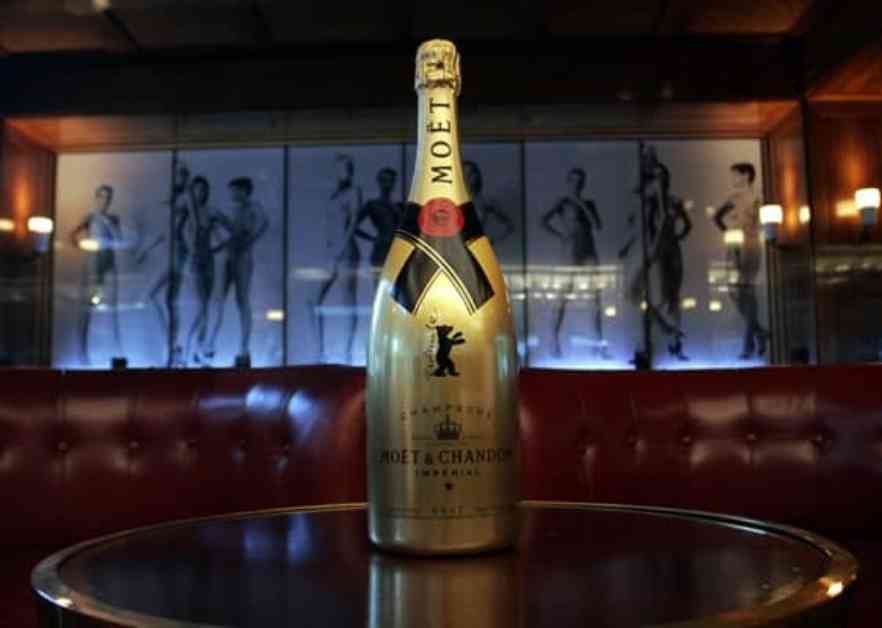LVMH dominates the wine and champagne market in London, according to a recent report by Brand Finance. The top four most valuable brands in 2024 are all owned by LVMH, showcasing their stronghold in the industry. Moët & Chandon continues to lead the pack with a brand value of USD1.4 billion, marking a 9% increase from the previous year. This iconic brand has solidified its position as the most valuable wine and champagne brand in London.
Chandon follows closely behind with a brand value of USD1 billion, although it experienced a slight decrease of 1%. Veuve Clicquot and Dom Pérignon also saw growth in their brand values, with increases of 2% and 7% respectively. Veuve Clicquot’s brand value now stands at USD959.2 million, while Dom Pérignon’s brand value reached USD799.8 million. These brands have all maintained their prestige and luxury status in the market, appealing to discerning consumers who seek quality and sophistication in their wine and champagne choices.
On the global front, China’s Changyu, which was the second most valuable brand last year, dropped to fifth place due to a significant 33% decrease in brand value to USD706.8 million. Despite this decline, Changyu still holds the highest Brand Strength Index (BSI) score among wine and champagne brands, indicating strong familiarity and consideration among consumers. However, stakeholders’ perceptions of Changyu’s price premium have diminished, possibly attributed to increased competition in the Chinese wine market.
Brand Finance’s research highlights the evolving landscape of the wine industry, with sustainability emerging as a key driver of customer consideration. A notable 11% of consumer decision-making is now influenced by sustainability practices, prompting wine producers to adopt environmentally friendly initiatives. Companies are focusing on reducing pesticide use, recycling water, and ensuring fair treatment for vineyard workers to align with consumer preferences for ethical and eco-conscious brands.
Henry Farr, Director at Brand Finance, emphasizes the importance of transparent communication regarding sustainability efforts to build consumer trust and preference. Producers who effectively communicate their environmental initiatives are likely to gain a competitive edge and secure brand success in the future. As the wine industry adapts to meet the demands of environmentally conscious consumers, brands that prioritize sustainability will stand out and attract a loyal following.
In a rapidly changing market landscape, wine and champagne brands are recognizing the significance of sustainability not only in meeting consumer expectations but also in ensuring long-term viability. The shift towards eco-friendly practices is reshaping the industry, prompting producers to rethink their approach to vineyard management and production processes. By embracing sustainability, brands can differentiate themselves in a crowded market and appeal to a growing segment of environmentally conscious consumers.
Impact of Sustainability on Consumer Preferences
The increasing emphasis on sustainability in the wine and champagne industry reflects a broader trend towards eco-conscious consumerism. As more consumers prioritize ethical and environmentally friendly products, brands that align with these values are gaining traction in the market. Sustainability has become a key differentiator for wine and champagne brands, influencing consumer perceptions and purchase decisions.
According to a survey conducted by Brand Finance, 67% of consumers are willing to pay more for sustainable products, highlighting the growing demand for eco-friendly options. This trend is particularly evident in the wine sector, where consumers are becoming more discerning about the environmental impact of their purchases. Brands that prioritize sustainability are not only meeting consumer expectations but also positioning themselves as leaders in the industry.
Strategies for Sustainable Growth
In response to the shifting consumer landscape, wine and champagne brands are implementing a range of sustainability initiatives to reduce their environmental footprint. From vineyard management to packaging and distribution, brands are exploring innovative ways to minimize waste, conserve resources, and promote biodiversity. These efforts are not only beneficial for the environment but also contribute to brand loyalty and reputation.
One strategy that many brands are adopting is the use of organic and biodynamic farming practices. By eschewing synthetic pesticides and fertilizers, producers can minimize their impact on the environment and produce healthier, more sustainable grapes. Organic and biodynamic wines are gaining popularity among consumers who value natural and chemical-free products, driving demand for eco-friendly options in the market.
Another key area of focus for wine and champagne brands is sustainable packaging. As consumers become more conscious of single-use plastics and excess packaging, brands are exploring alternatives such as recycled materials, lightweight glass bottles, and compostable packaging. By reducing waste and promoting recyclability, brands can appeal to environmentally conscious consumers and demonstrate their commitment to sustainability.
Building Consumer Trust through Transparency
Transparency is essential for establishing consumer trust and fostering loyalty in the wine and champagne industry. Brands that are open and honest about their sustainability practices are more likely to resonate with consumers and build lasting relationships. By sharing information about their sourcing, production methods, and environmental impact, brands can showcase their commitment to sustainability and demonstrate authenticity to consumers.
Effective communication is key to conveying a brand’s sustainability efforts and engaging consumers in a meaningful way. Brands can leverage digital platforms, social media, and marketing campaigns to educate consumers about their sustainability initiatives and encourage them to make informed purchasing decisions. By highlighting their commitment to ethical and eco-friendly practices, brands can differentiate themselves in the market and attract a loyal customer base.
In conclusion, the wine and champagne industry in London is undergoing a transformation as sustainability emerges as a key driver of consumer preference. Brands that prioritize sustainability are well-positioned to thrive in this changing landscape, appealing to eco-conscious consumers and differentiating themselves in a competitive market. By adopting sustainable practices, communicating transparently with consumers, and innovating in environmentally friendly ways, wine and champagne brands can secure long-term success and build a loyal following.





















